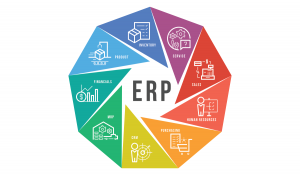 Enterprise resource planning (ERP) software, a set of tools, shares a common process and data model, helping businesses better track information while gathering insights across the departmental spectrum. The ERP software unites segregated processes into a central data network and automates end-to-end operational processes, such as accounting, analytics, inventory management, customer relationship management (CRM), and human resources (HR) management.
Enterprise resource planning (ERP) software, a set of tools, shares a common process and data model, helping businesses better track information while gathering insights across the departmental spectrum. The ERP software unites segregated processes into a central data network and automates end-to-end operational processes, such as accounting, analytics, inventory management, customer relationship management (CRM), and human resources (HR) management.
The real-time data input saves valuable time, with the granularity needed to see where and when certain events took place. This further allows businesses to make better, timelier decisions, syncing the machine tools, people, and software systems in a big, data-based ecosystem.
ERP software systems have become a core part of the industrial revolution, industry 4.0, and now the advent of industry 5.0. With most manufacturing facilities already poised to embrace industry 5.0 regulations, ERP software solutions are expected to have a significant importance.
COVID 19 disruptions have impacted the ERP software market positively. Due to the pandemic-driven lockdown and physical distancing mandates, manufacturing sectors faced various daunting challenges, ranging from obtaining raw materials and workforces required to deliver the end products to the market. This, as a result, forced digitization and automation across the manufacturing sectors globally.
Many manufacturing facilities digitized their business processes, including supply chain & product management, sales & marketing, accounting & finance, and human resource. The automation increased the use of cloud-based ERP solutions and services, increasing the ERP software market share.
ERP software system offers businesses plenty of benefits, such as enhanced accessibility, advanced analytics, workflow automation, and streamlined business operations. ERP software, whether a subset or a stand-alone system, focuses on core components, including cloud-based ERP system, inventory management software, manufacturing software, supply chain management software, and HR software.
In the rapidly evolving technology landscape, enterprises are constantly looking for flexible software solutions to streamline processes and strengthen expertise. Each year, the majority of enterprises substantially spend on buying ERP solutions and keeping them up-to-date with the latest technological advancements.
It is essential to upgrade enterprise systems to sustain the cut-throat competition and volatile market conditions. Similarly, keeping up with the latest ERP trends is advantageous to consumers as well as to service providers. Let’s have a look at the top ERP trends that will dominate the year 2021.
The adoption of cloud, mobile apps, and other smart technologies is likely to increase exponentially in the coming years, and we’re going to witness significant progress in 2021. Simultaneously, the integration of Artificial Intelligence (AI) and the Internet of Things (IoT) with ERP systems would open a vast range of possibilities.
While ERP systems have always been extremely useful in collecting and organizing data, they lack reporting and analysis. Most present-day ERP systems are natively equipped with powerful data analytics features as companies are now accentuating quick data-driven decisions.
Today’s advanced ERP systems are rapidly changing the way companies do business. More advanced technologies are added to ERP systems every year to drive efficiencies. This would foster the ERP software market dynamics with many changes coming into the picture by 2021.
Future ERP trends presage consumer preference inclining towards the cloud as vendors offer personalized solutions with continuous updates. Moreover, the rising adoption of technologies like AI and IoT would increase ERP implementation more than ever.
A cloud-based ERP system allows large businesses to manage and track resources and information across various departments and segments cloud-based tools, including business intelligence, inventory management, CRM, and HR.
The inventory management software offers a range of features, including product categorization, sales & purchase order tracking, electronic scanning, and automatic ordering that help businesses track product inventories through various supply chain process stages.
Manufacturing software solution provides functionality to plan and execute manufacturing projects from beginning to end by automating materials planning, production tracking & scheduling, product lifecycle management, and others.
Supply chain management solutions manage end-to-end supply chain activities, from sourcing to distribution. These solutions enable the automation of time-consuming processes, such as procurement and warehouse picking, enabling a data-driven approach to supply chain management.
HR software helps business owners, recruiters, and HR departments attract, hire, manage, and develop employees. Moreover, the software can streamline operational needs and enhance workforce performance and learning management, optimizing worker engagement and productivity.
ShareAPR




About the Author:
I am a cybersecurity and IT instructor, cybersecurity analyst, pen-tester, trainer, and speaker. I am an owner of the WyzCo Group Inc. In addition to consulting on security products and services, I also conduct security audits, compliance audits, vulnerability assessments and penetration tests. I also teach Cybersecurity Awareness Training classes. I work as an information technology and cybersecurity instructor for several training and certification organizations. I have worked in corporate, military, government, and workforce development training environments I am a frequent speaker at professional conferences such as the Minnesota Bloggers Conference, Secure360 Security Conference in 2016, 2017, 2018, 2019, the (ISC)2 World Congress 2016, and the ISSA International Conference 2017, and many local community organizations, including Chambers of Commerce, SCORE, and several school districts. I have been blogging on cybersecurity since 2006 at http://wyzguyscybersecurity.com